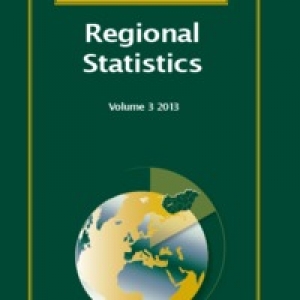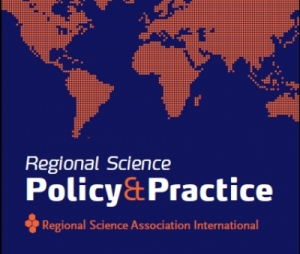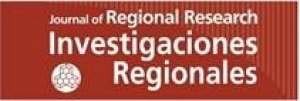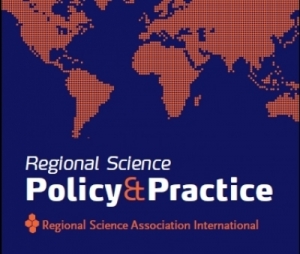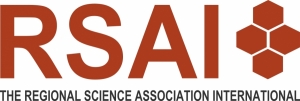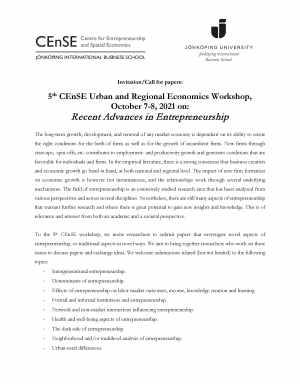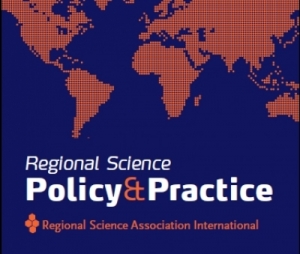Council
Elisabete Martins
Call for Papers and Special Session Proposals | 28th APDR Congress | 16-17 September 2021, UTAD, Vila Real, Portugal
Call for Papers and Special Session Proposals
The APDR invite regional scientists, economists, economic geographers, urban planners, policy makers, and researchers of related disciplines to participate in the 28th APDR Congress that will be held from 16 to 17 of September, 2021, University of Trás-os-Montes e Alto Douro (UTAD), placed in Vila Real, in the Northeast of Portugal
Beyond the various themes related to regional science this congress will focus on the emerging topic of Green and inclusive transitions in Southern European regions: What can we do better?.
The call for papers and Special Session Proposals are open and your participation is very welcome!
Themes of specific interest are:
- RS01 - Smart Sustainable Development
- RS02 - New Urban Agenda and Sustainable Development Goals
- RS03 - Circular Economy at Regional, National and International Level
- RS04 - Spatial Aspects of the Green Deal
- RS05 - Energy, Transports and Mobility, Agri-food and other Systemic Transitions
- RS06 - Climate Change Mitigation and Adaptation
- RS07 - Spatial Allocation of Public Goods and Services
- RS08 - Migration, Integration, Growth and Welfare
- RS09 - Regional Resilience and Crisis
- RS10 - Theory, Qualitative and Mixed-Methods in Regional Science
- RS11 - Natural Environment and Urban Development
- RS12 - Natural Environment and Rural Development
- RS13 - Low-Density Regions and Development
- RS14 - Territorial Cohesion and Asymmetries
- RS15 - Innovation, Entrepreneurship and Regional Development
- RS16 - Quality of life, Wellbeing and Happiness
- RS17 - Tourism, Sports and Regional Development
- RS18 - Big and Available Data for Regional Science
- RS19 - Geographic Information Systems and Location Modelling
- RS20 - Systemic Analysis of Transport and Communication Networks
- RS21 - Operational Models for Cities and Regions
- RS22 - Spatial Econometrics
- RS23 - Ecological Economics and Ecosystems Services approaches and methods
Deadline for Special Session proposals: June 14, 2021. Proposals should be sent by email to the secretariat of the Congress (This email address is being protected from spambots. You need JavaScript enabled to view it.).
Deadline for Abstracts submissions: July 5, 2021. Authors should submit their abstracts through online submission system by following the link https://cmt3.research.microsoft.com/APDR2021.
All information at the congress website: http://www.apdr.pt/congresso/2021
Looking forward to meeting you in Vila Real!
The Organizing Committee and the Board of APDR 28th APDR Congress
New Post-doctoral Fellow/Research Associate | Division of Public Policy
The Division of Public Policy (PPOL) seeks to recruit a new Post-doctoral Fellow/Research Associate with specialty in the broad areas of urban policy, including transportation, land use, economic development, housing, and social equity. Main tasks of the appointee include conducting research on a wide range of urban topics which will be determined by the faculty supervisor, assisting in supervising PhD and Master students in the team, and developing his/her own research agenda.
Applicants should have a recognized PhD degree in relevant discipline, including but not limited to, transportation engineering, urban planning, urban studies, regional science, geography, urban economics, and public policy. The successful applicant is expected to have strong analytical skills, sense of responsibility, responsiveness to fast-paced research environment, and excellent independent research ability. The candidate must have been well trained in quantitative research methodologies such as statistical analysis, big data analytics, machine learning and/or GIS. Familiarity with qualitative research methods is a plus. Interested candidates are encouraged to apply as soon as possible. (Duration: 1 year, with a possibility of 1-year renewal subject to performance and funding)
Salary is highly competitive and will be commensurate with qualifications and experience. Fringe benefits include annual leave, medical and dental benefits. Contract renewal will be subject to performance, funding availability and mutual agreement.
Please complete an online application form through the HKUST Careers website (https://hkustcareers.ust.hk) and return it online together with (a) a curriculum vitae; (b) a letter of intent describing their motivation, qualifications, skills and experience relevant to this position; (c) 2-5 writing samples (e.g., working papers, journal publications); and (d) 2-3 reference letters to the Human Resources Office on or before Friday, 16 April 2021.
For enquiries, please contact Dr. Pengyu ZHU (This email address is being protected from spambots. You need JavaScript enabled to view it.).
You can view and apply for this job at:
The New Issue of Regional Statistics is already Available! (2021, VOL 11, No 2)
THE NEW ISSUE OF REGIONAL STATISTICS IS ALREADY AVAILABLE!
We are pleased to inform you that a new issue of the Regional Statistics has been released and now it’s avaiable online.
http://www.ksh.hu/terstat_eng_current_issue
REGIONAL STATISTICS, 2021, VOL 11, No 2.
STUDIES
Tamás Sebestyén − Erik Braun − Zita Iloskics − Attila Varga: Spatial and institutional dimensions of research collaboration: a multidimensional profiling of European regions
http://www.ksh.hu/statszemle_archive/regstat/2021/2021_02/rs110203.pdf
George Petrakos − Konstantinos Rontos − Chara Vavoura − Luca Salvati − Ioannis Vavouras: Political budget cycles and effects of the excessive deficit procedure: The case of Greece
http://www.ksh.hu/statszemle_archive/regstat/2021/2021_02/rs110202.pdf
Kamran Jafarpour Ghalehteimouri − Ali Shamaei − Faizah Binti Che Ros: Effectiveness of spatial justice in sustainable development and classification of sustainability in Tehran province
http://www.ksh.hu/statszemle_archive/regstat/2021/2021_02/rs110201.pdf
Foued Ben said: Recent tendency in Tunisian industrial firms’ location
http://www.ksh.hu/statszemle_archive/regstat/2021/2021_02/rs110204.pdf
Sruthi Krishnan V − Mohammed Firoz C: Impact of land use and land cover change on the environmental quality of a region: A case of Ernakulam district in Kerala, India
http://www.ksh.hu/statszemle_archive/regstat/2021/2021_02/rs110205.pdf
László Kökény − Kornélia Kiss: There is a time and a place for everything (and for everyone): Examining main socio-demographic and territorial differences in use of leisure time
http://www.ksh.hu/statszemle_archive/regstat/2021/2021_02/rs110206.pdf
Imre Dobos − Gábor Michalkó − Péter Sasvári: The publication performance of Hungarian economics and management researchers: A comparison with the Visegrád 4 countries and Romania
http://www.ksh.hu/statszemle_archive/regstat/2021/2021_02/rs110207.pdf
Márta Bakucz − Ilona Cserháti − Tibor Keresztély − Gábor Michalkó: An analysis of the major factors shaping the tourismrelated spending of senior citizens in Hungary
http://www.ksh.hu/statszemle_archive/regstat/2021/2021_02/rs110208.pdf
Join us to our social networking sites:
RSPP Call for Papers | Special Issue on Territorial dimensions of green and digital transitions
RSPP Call for Papers
Special Issue on
Territorial dimensions of green and digital transitions
The European Green Deal (EGD) is a growth strategy aiming at transforming the European Union into a climate-neutral space by 2050. Aware of its major social side-effects, the EU is launching special funds to support the mitigation of expected inequalities generated by the green transition in order to keep it also a just transition. Accelerated by the COVID-19 pandemic, the global digital transformation is envisaged as an enabler background for the green transition, despite the lack of consensus regarding the environmental footprint of this transformation (Itten et al., 2020). An effective coordination between green and digital transitions is currently seen as crucial to the European recovery, which must be based on principles such as solidarity, convergence and cohesion in order to be fair and inclusive. The topicality of the theme is evident in the motto for the current Presidency of the Council of the European Union: “for a fair, green and digital recovery” (2021PORTUGAL.EU, 2021).
Studies on sustainable transitions contribute to a growing interdisciplinary research field which have produced, particularly in the last decade, theoretical and methodological advances, alongside with empirical evidence, on how to understand the rise and development of sustainable transitions in different areas, such as energy, mobility, or agri-food systems. The spatial dimensions of sustainability transitions is the focus of the emergent field of geography of sustainable transitions. However, the design of a macro-level green growth strategy, such as the EGD, pulled by a social and political demand for major transformations in the global economy, require a major effort of research from multidisciplinary fields. It is crucial to understand and support in-depth change processes that are or should be undertook by institutions, firms, and value chains, alongside with the assessment of their effects on people and places.
The aim of this special issue is thus to bring together research contributions from different fields, helping to enlighten how these major changes in global systems, such as the energy, mobility, heritage, tourism, agri-food, services, and manufacturing industry, will shape the transitions at the micro and meso-levels and affect people and places, namely territorial inequalities and social exclusion phenomena. Consequently, we welcome innovative theoretical and methodological approaches, as well as empirical evidence, focused on responding to those questions, encompassing multiple topics driven by a focus on the territorial specificities - rural and peripheral regions, sparsely populated areas, small and medium size towns, urban-rural interfaces - , spillovers, exclusions and inequalities raised by green and digital transitions driven by technological disruptive innovation, consumption trends, citizens’ claims, natural resources and ecosystems depletion, public policies, or firm strategies.
These are some examples of topics relevant for the special issue on the territorial dimensions of green and digital transitions:
- Mapping and describing of underway transitions
- Identifying determinants of transitions’ unlock
- Understanding how transitions affect people and places
- Assessing spatial patterns of transitions’ and respective impacts
- Uncovering costs, benefits, side-effects and spillovers of green and digital megatrends
- Discussing territorial competitiveness, fairness and inclusiveness of policy-led transitions
- Evaluating policy-led transitions
Planning
There are alternative ways to pre-select papers for this special issue:
- A selection of extended abstracts submitted to the RSAI World Congress will be invited to deliver a full paper (please refer to this page with instructions to select RSPP for post-conference publication).
- A selection of extended abstracts submitted to the Special Session S29 of the ERSA Conference will be invited to deliver a full paper (please refer to this page with instructions to submit the extended abstract).
- A selection of extended abstracts submitted to the Regional Helix 2021 Conference will be invited to deliver a full paper (please refer to this page with instructions to select RSPP for post-conference publication).
- Authors not attending the conferences above mentioned may send an extended abstract (1,200-2,000 words) to the editors until June 30, 2021
Please note that the full paper must be submitted to RSPP by October 15, 2021.
Editors
- Lívia Madureira, CETRAD – The Centre for Transdisciplinary Development Studies, UTAD – University of Trás-os-Montes and Alto Douro, Vila Real, This email address is being protected from spambots. You need JavaScript enabled to view it.
- Carlos Peixeira Marques, CETRAD – The Centre for Transdisciplinary Development Studies, UTAD – University of Trás-os-Montes and Alto Douro, Vila Real, This email address is being protected from spambots. You need JavaScript enabled to view it.
- Giuseppina Cassalia, Department of Heritage, Architecture, Urban Planning, Mediterranean University of Reggio Calabria, This email address is being protected from spambots. You need JavaScript enabled to view it.
References
- 2021PORTUGAL.EU. (2021). Programme for the Portuguese Presidency of the Council of the European Union (https://www.2021portugal.eu/media/e0rjnvdj/programme-for-the-portuguese-presidency-of-the-council-of-the-european-union-en.pdf
- Itten, R., Hischier, R., Andrae, A. S. G., Bieser, J. C. T., Cabernard, L., Falke, A., Ferreboeuf, H., Hilty, L. M., Keller, R. L., Lees-Perasso, E., Preist, C., & Stucki, M. (2020). Digital transformation — life cycle assessment of digital services, multifunctional devices and cloud computing. The International Journal of Life Cycle Assessment, 25(10), 2093-2098. https://doi.org/10.1007/s11367-020-01801-0
New Issue 49 of Investigaciones Regionales - Journal of Regional Research
Summary of Volume 49 Investigaciones Regionales - Journal of Regional Research
Volume 49 of the Journal of Regional Research – Investigaciones Regionales has been published, including up to 8 papers. This issue opens with the work devoted to European Issues, and is titled “Performance of nonbanking organisations granting guarantees within cohesion policy”. Professors Halina Waniak-Michalak, Jan Michalak and Maciej Turala study a less studied mechanism of European Policy: the mechanism for guarantee distribution, which is mainly distributed through NGOs (nonbanking organisations granting guarantees – NOGG). The article studies the relationship between the level of regional development, the experience of nonbanking organisations granting guarantees and their performance. The results confirm that there exist positive associations between the level of regional development, NOGG size (measured with guarantee capital) and experience and some financial performance measures, and calls for future EU-wide comparative research allowing deeper understanding of various guarantee distribution mechanisms performance.
Within the articles section we find the paper titled “Optimal Taxation and Decentralization: The case of the PIT”, authored by Professor Alejandro Esteller. He wonders whether decentralization might be welfare-enhancing. To asses this, he focuses on a paradigmatic legal element: the top marginal tax rate on labor income. Taking advantage of the theoretical framework of the recent optimal tax theory he compares – from microdata of the Survey of Life Conditions (conducted by the Spanish National Statistical Institute – the real rates with the optimal ones. There is a discrepancy for all ACs; being for all of them the optimal rate above the real one. According to his results, all but four ACs have set their tax rate closing the gap with their optimum.
The article “Advanced estimation of regional growth using LSTM neural networks”, authored by Juan de Lucio, studies the incorporation of Artificial Intelligence techniques to the set of tools available for the analysis of the regional situation. The estimates using neural networks are compared with the most common instruments in the analysis of conjuncture. Results show that advances in neural networks can be incorporated into the tools used in regional economic analysis reducing the estimation error. They are complementary tools, with greater flexibility to capture the diversity of situations in the real economy and with a higher estimation capacity. The document suggests the use of these types of techniques to solve a variety of problems in regional research.
Angeles Cámara and Ana Medina publish the work “Measuring the economic impact of immigrant workers exit from Madrid region labor market”. This paper analyses the economic impact of the loss of employment suffered by the immigrant population in Madrid’s regional economy during the period 2010-2016. First, it examines the labour characteristics of the immigrant population, a community mainly employed in unstable and low-skilled jobs and overrepresented in economic sectors that are sensitive to fluctuations in the labour market. Financial crisis forced these workers exiting labour market and the present work focuses on the modelling of this phenomenon by means of the construction of a multisectoral model of the supply-side type (Ghosh model), and provides estimates of the direct impacts of the immigrant working population leaving the labour market, and of its indirect and induced impacts on the greater economy.
The next paper is titled “Is there a political bias in the municipal distribution of regional funds? The example of the Region of Murcia”, being the authors Ana-María Ríos, María-Dolores Guillamón, Antonio-José García and Bernardino Benito. This paper aims studies the criteria that determine the amount of funds received by the 45 municipalities that comprise the Region of Murcia, where there is no local funding law, from the autonomous government during the period 2009-2017. Our results show that, contrary to expectations, no political factors are sufficiently relevant to determine the transfers received. On the other hand, it is found that budgetary criteria of sufficiency, investment and per capita debt are the most important ones to explain the transfers received by the municipalities.
Another paper dealing with local issues in the one authored by Francisca J. Sánchez-Sánchez, Ana M. Sánchez-Sánchez, Noemí Pulido, and Diego V. Borrero and titled “Measuring the labour efficiency in Andalusia (Spain): A DEA approach”. This paper analyses the labour efficiency in Andalusia, and takes into account labour and demographic characteristics of the Andalusian municipalities. Using Data Envelopment Analysis, they find differences at the municipal level that depend on the geographical arrangement, with the provincial capitals being the least efficient. An inverse relationship is established between the size of the municipality (in terms of number of inhabitants) and its labour efficiency: the smaller the size of the municipality, the greater the efficiency. The distance to the capital is also important in establishing the efficiency.
The next paper of this issue is “Obstacles and innovation capabilities from a regional perspective: the case of Patagonia in Argentina”, and is coauthored by Valeria Arza and Emanuel López. They compare the effect of external obstacles and internal capabilities on firms’ innovation and productivity in Patagonia versus the rest of the country for 2014-2016. Their hypothesis is that the regional context influences those effects. They find that in that region external obstacles affect, not only the decisions to invest in innovation, as it happens nationally, but also its intensity. Internal capabilities are lower than in the rest of the country but have a greater impact to encourage innovation decisions. They suggest that the regional dimension should be considered in innovation policy.
The last paper is titled “Regional analysis of the private label in online shopping” and the authors are Eloy Gil Cordero, Francisco Javier Rondan Cataluña, Manuel Rey Moreno. Their main objective is to analyze regional consumer behavior when purchasing a private label (PL) product online, based on the relationships of the PL with respect to the online PL quota by regions in Spain, assortment of online PLs and purchase online of PLs. In this study, a total of 17,484 online purchases of PL and 92,094 online purchases of manufacturers' brands were analyzed. By means of latent class regression models, they find that the relation between PL purchase amount and the variables total purchase amount, purchase of unbranded products and manufacturers brands in the online channel varies between regions, not having an equal behavior for all online users, even using the same retail environment.
To contact Us and Submit Manuscripts:
Investigaciones Regionales – Journal of Regional Research
Email: This email address is being protected from spambots. You need JavaScript enabled to view it.
The article will be sent through the portal Open Journal System (OJS) of the Spanish Repository of Science and Technology (RECYT): https://recyt.fecyt.es/index.php/IR/login
ISSN: 1695-7253 E-ISSN: 2340-2717
If you do not wish to receive e-mail updates from us This email address is being protected from spambots. You need JavaScript enabled to view it.
RSPP Virtual Issue | Women's Space in the Women's Day
Table of Contents
Transport‐induced agglomeration effects: Evidence for US metropolitan areas
Patricia C. Melo; Daniel J. Graham
First Published:15 February 2018
Localization of manufacturing industries and specialization in Mexican states: 1993–2013
Manuel Gómez‐Zaldívar; Marco T. Mosqueda; J. Alejandra Duran
First Published:30 January 2018
Free Access
The economic impact of a new solar power plant in Arizona: Comparing the input‐output results generated by JEDI vs. IMPLAN
First Published:29 June 2016
Estimation and determinants of energy efficiency in Japanese regional economies
First Published:22 April 2015
Rationale and design of EU cohesion policies in a period of crisis
First Published:06 November 2014
Post-doctoral Fellow/Research Associate | Division of Public Policy
The Division of Public Policy (PPOL) and School of Engineering seek to recruit a new Post-doctoral Fellow/Research Associate to work on a research project entitled “Strategic Planning for Transforming Hong Kong into a Leading Global Aviation and Innovation Hub”, which is supported by General Support Programme (GSP) under Innovation and Technology Fund. This project aims to study the new trends in the global aviation technology industry under the COVID-19 pandemic, evaluate Hong Kong's positioning by interviewing all relevant stakeholders, conduct a series of international case studies through site visits and interviews to investigate possible technological innovations applicable to Hong Kong, and put together a technology roadmap with five established foci.
The appointee will be housed in the PPOL but will work closely with a cross-disciplinary team of faculty from Public Policy, Aerospace Engineering and Computer Science on this project. During the appointment, the major responsibility is to take the leadership role of a project manager and ensure the progress and timely delivery of the project. Main tasks include supervising PhD students and Master students in the team, contacting involved stakeholders, scheduling and conducting interviews, focus group discussions and workshops (both internationally and within Hong Kong), assisting aviation conference organization at the end of project, writing project reports, and co-authoring journal articles. Depending on performance, the employment can be renewed for another year, during which the appointee will mainly be collaborating with the supervisors on academic research and publications.
Applicants should have a recognized PhD degree in social sciences, management, public policy, urban planning, english language, communication and applied linguistics, or related discipline, with an excellent command of written and spoken English. The successful applicant is expected to have strong communication skills, project management capability, sense of responsibility and project timeliness, responsiveness to fast-paced research environment, and excellent independent research ability. The candidate must have been well trained in qualitative research methodologies such as interviews, focus group discussions and workshops. Experience and interest in relevant air transportation or technological advancement related research are desirable. Familiarity with quantitative research such as statistical analysis and machine learning is a plus, but not necessary. The appointment is expected to commence in April 2021. (Duration: 1 year, with a possibility of 1-year renewal depending on performance)
Salary is highly competitive and will be commensurate with qualifications and experience. Fringe benefits include annual leave, medical and dental benefits. Contract renewal will be subject to performance, funding availability and mutual agreement.
Application Procedure
In support of a green work environment, we accept applications submitted online only. To apply, please complete an online application form through the HKUST Careers website (https://hkustcareers.ust.hk) and return it online together with (a) a curriculum vitae; (b) a letter of intent describing their motivation, qualifications, skills and experience relevant to this position; (c) 2-5 writing samples (e.g., working papers, journal publications, white papers, consulting reports); and (d) 2-3 reference letters to the Human Resources Office on or before Tuesday, 23 March 2021. Applicants will receive an acknowledgement by email upon successful submission. We thank applicants for their interest, but advise that only shortlisted candidates will be notified of the result of the application.
For enquiries, please contact Dr. Pengyu ZHU (This email address is being protected from spambots. You need JavaScript enabled to view it.).
For online application, please use the following link:
Call for applications | The Peter Nijkamp Research Encouragement Award
Call for applications
The Peter Nijkamp Research Encouragement Award
The award recognizes the outstanding potential of a mid-career researcher from a nation in the developing world in which there is a section of RSAI. Conditions for applications are:
- No more than 10 years from the doctoral qualification (by Dec 31, 2020);
- Live in developing nations continuously for at least three years as at Dec 31, 2020;
- Be a member of RSAI in good standing;
- Submit a written formal research paper on a topic in Regional Science;
- Submit an updated version of CV.
All material must be submitted to the This email address is being protected from spambots. You need JavaScript enabled to view it.
Nominees will be judged in part on the evaluation of the paper and in part on an evaluation of the research track record and performance (CV).
The winner(s) will receive support, up to 750 Euro, to participate in a Supra-Regional meeting or in the World Congress, at which the paper will be presented.
The jury will comprise the Immediate Past-President of RSAI as Chair, an Editor of Papers in Regional Science, and two RSAI Fellows.
Deadline for the applications: April 15, 2021.
Call for papers: 5th CEnSE Urban and Regional Economics Workshop, October 2021, Sweden
Invitation/Call for papers:
5th CEnSE Urban and Regional Economics Workshop,
October 7-8, 2021 on:
Recent Advances in Entrepreneurship
The long-term growth, development, and renewal of any market economy is dependent on its ability to create the right conditions for the birth of firms as well as for the growth of incumbent firms. New firms through start-ups, spin-offs, etc. contributes to employment- and productivity growth and generates conditions that are favorable for individuals and firms. In the empirical literature, there is a strong consensus that business creation and economic growth go hand in hand, at both national and regional level. The impact of new firm formation on economic growth is however not instantaneous, and the relationships work through several underlying mechanisms. The field of entrepreneurship is an extensively studied research area that has been analyzed from various perspectives and across several disciplines. Nevertheless, there are still many aspects of entrepreneurship that warrant further research and where there is great potential to gain new insights and knowledge. This is of relevance and interest from both an academic and a societal perspective.
To the 5th CEnSE workshop, we invite researchers to submit papers that investigate novel aspects of entrepreneurship, or traditional aspects in novel ways. We aim to bring together researchers who work on these issues to discuss papers and exchange ideas. We welcome submissions related (but not limited) to the following topics:
- Intergenerational entrepreneurship.
- Determinants of entrepreneurship.
- Effects of entrepreneurship on labor market outcomes, income, knowledge creation and learning.
- Formal and informal institutions and entrepreneurship.
- Network and non-market interactions influencing entrepreneurship.
- Health and well-being aspects of entrepreneurship.
- The dark side of entrepreneurship.
- Neighborhood and/or multilevel analysis of entrepreneurship.
- Urban-rural differences.
- Cross-country analyses.
You are welcome to suggest additional topics that you think would be suitable for this workshop. We welcome both theoretical and empirical contributions.
WHEN? The workshop will take place October 7-8, 2021.
VENUE? The conference, dinner, and accommodation will take place at Hällsnäs Hotel and Conference (http://hallsnas.bookvisitweb.com/en), which is located in a scenic rural setting conveniently close to Landvetter Airport, Gothenburg. Landvetter is Sweden’s second-largest airport with easy access to many international connections (https://www.swedavia.se/landvetter).
COST? The workshop attendance is free of charge, and accommodation and meals will be covered by the organizers. Travel costs, however, will have to be covered by the participants.
HOW? The workshop is organized by the research centre CEnSE (Centre for Entrepreneurship and Spatial Economics) at Jönköping International Business School (JIBS), Sweden. The workshop will have three keynote speakers and individual paper sessions. All papers will be assigned a discussant and all presenters/participants are expected to serve as discussants. We aim to encourage constructive discussions in an interactive setting and there will be no parallel sessions. Therefore, the size of the workshop will be limited. The organizers of the workshop aim to arrange an outlet in the form of a special issue in an international journal.
KEYNOTE SPEAKER I – Olav Sorenson is the Joseph Jacobs Chair in Entrepreneurial Studies, Professor of Strategy, and Faculty Research Director of the Price Center for Entrepreneurship & Innovation at the Anderson Graduate School of Management at UCLA. His primary stream of research pertains to economic geography, focusing on how entrepreneurship influences the growth and competitiveness of regions within countries and on why some regions appear more supportive to entrepreneurs than others. In 2018, he received the Global Award for Entrepreneurship Research.
KEYNOTE SPEAKER II – Karl Wennberg is a Professor in organization and entrepreneurship at Linköping University, Sweden. He is conducting interdisciplinary research at the intersection of Entrepreneurship, Organisational Sociology and Regional Science and has published more than 100 peer-reviewed articles, book chapters, books and reports. He is on the Editorial Boards of Academy of Management Journal, Journal of Business Venturing and Journal of Business Venturing Insights and senior editor of Entrepreneurship Theory & Practice.
KEYNOTE SPEAKER III – Pontus Braunerhjelm is a Professor in Economics at the Royal Institute of Technology and at the Blekinge Institute of Technology. He is also engaged at the research institute Swedish Entrepreneurship Forum as a research director. His research focus on entrepreneurship, innovation and SMEs and their contribution to industrial dynamics and economic growth. Pontus has published over 200 peer-reviewed articles and is an active and sought-after member in the public debate.
ABOUT CEnSE: CEnSE is a multi-disciplinary institute that performs applied research relating to issues of entrepreneurship and business renewal, regional development and growth, and the interrelation between urban and rural areas. A substantial part of CEnSE´s research addresses policy-relevant problems, for example how accessibility affects regional growth and the way entrepreneurial and innovative processes in business and society are dependent on knowledge and creativity. The project portfolio of CEnSE contains both research of general applicability and projects that are directed towards specific stakeholders. Visit https://ju.se/center/cense for more information about CEnSE.
You are encouraged to distribute this call to other interested researchers.
Organizers:
Mikaela Backman, This email address is being protected from spambots. You need JavaScript enabled to view it., co-director of CEnSE
Johan Klaesson, This email address is being protected from spambots. You need JavaScript enabled to view it., director of CEnSE
Sofia Wixe, This email address is being protected from spambots. You need JavaScript enabled to view it., co-director of CEnSE
Deadlines and information:
Abstract submission deadline: June 20, 2021.
Notification of acceptance: June 30, 2021.
(Draft) Paper submission deadline: October 1, 2021.
Please submit contributions to: This email address is being protected from spambots. You need JavaScript enabled to view it.
Winners RSPP Paper Award
Following the procedures to select the RSPP paper award, the jury constituted by Gordon Mulligan, David Plane , Philip McCann, Neil Reid and Tomaz Dentinho selected two articles as winners of the 2022 Best Paper award on RSPP. Congratulations to all winners!
The two papers are:
- Gabriel Lyrio de Oliveira and André Luis Squarize Chagas (2020) - Effects of a cash transfer programme on origin–destination migration flows. Regional Science Policy & Practice 12(1), 83–104.
Motivation:
Very thorough study using state-of-art regional science methodology to study effects of the Bolsa Familia programme in Brazil, showing an Interesting and pedagogical method to analyse the regional redistribution of income with very good data and important results for policy makers. Spatial and social redistribution of public money is an important topic and a good exemplar of a RSPP article.
- Kevin Credit (2020) - Neighbourhood inequity: Exploring the factors underlying racial and ethnic disparities in COVID- 19 testing and infection rates using ZIP code data in Chicago and New York. Regional Science Policy & Practice 12(6),1249-1271.
Motivation:
The paper focus a cutting-edge topic using a fine-grained neighbourhood modelling leading to interesting empirical findings s as well as specific and focused policy recommendations tied to the study results. It is a very relevant demonstration that it is possible and advisable to get scientific evidences from emergent phenomena that can be useful for policy makers.
About Us
The Regional Science Association International (RSAI), founded in 1954, is an international community of scholars interested in the regional impacts of national or global processes of economic and social change.


